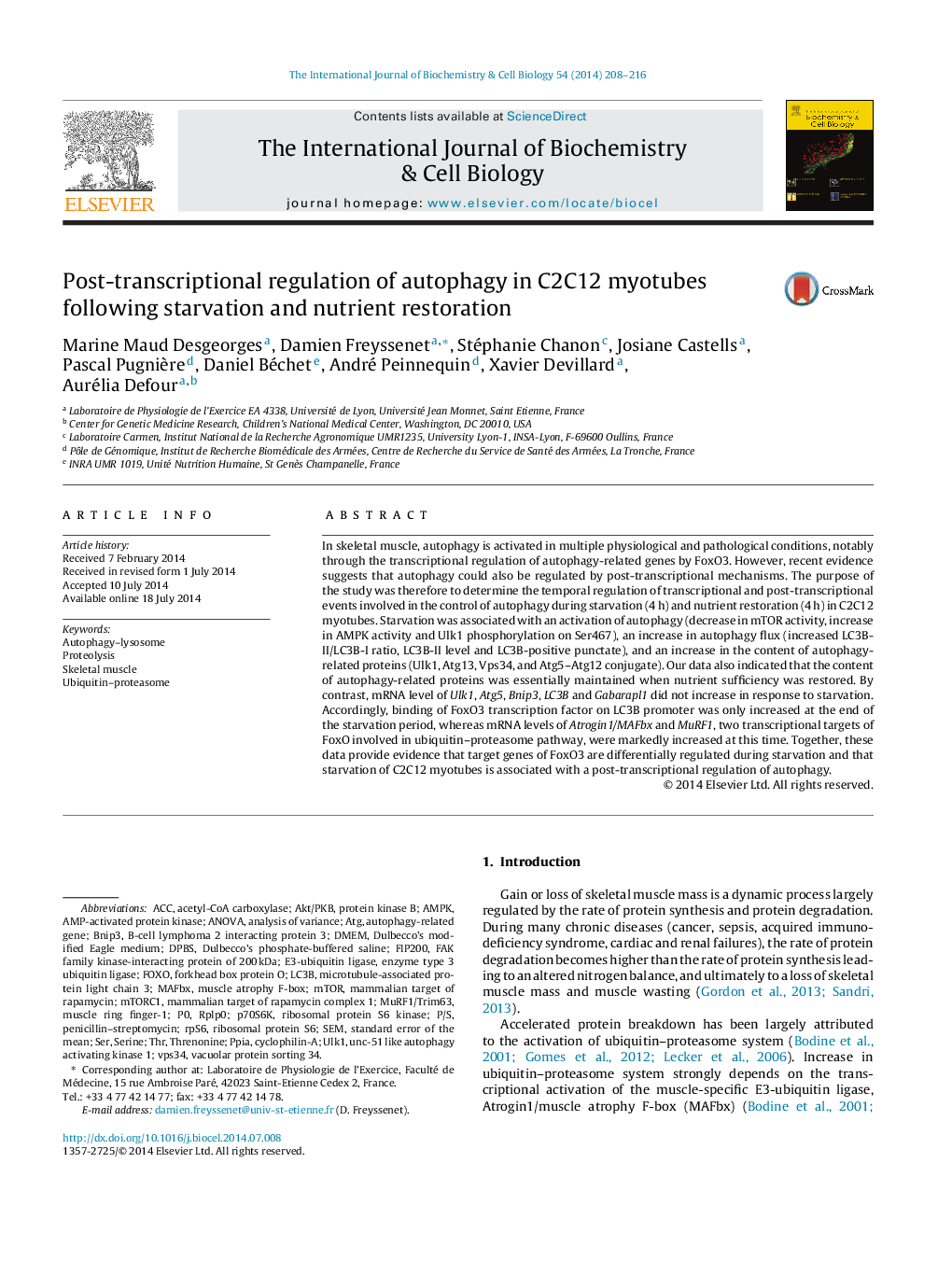| Article ID | Journal | Published Year | Pages | File Type |
|---|---|---|---|---|
| 8323235 | The International Journal of Biochemistry & Cell Biology | 2014 | 9 Pages |
Abstract
In skeletal muscle, autophagy is activated in multiple physiological and pathological conditions, notably through the transcriptional regulation of autophagy-related genes by FoxO3. However, recent evidence suggests that autophagy could also be regulated by post-transcriptional mechanisms. The purpose of the study was therefore to determine the temporal regulation of transcriptional and post-transcriptional events involved in the control of autophagy during starvation (4Â h) and nutrient restoration (4Â h) in C2C12 myotubes. Starvation was associated with an activation of autophagy (decrease in mTOR activity, increase in AMPK activity and Ulk1 phosphorylation on Ser467), an increase in autophagy flux (increased LC3B-II/LC3B-I ratio, LC3B-II level and LC3B-positive punctate), and an increase in the content of autophagy-related proteins (Ulk1, Atg13, Vps34, and Atg5-Atg12 conjugate). Our data also indicated that the content of autophagy-related proteins was essentially maintained when nutrient sufficiency was restored. By contrast, mRNA level of Ulk1, Atg5, Bnip3, LC3B and Gabarapl1 did not increase in response to starvation. Accordingly, binding of FoxO3 transcription factor on LC3B promoter was only increased at the end of the starvation period, whereas mRNA levels of Atrogin1/MAFbx and MuRF1, two transcriptional targets of FoxO involved in ubiquitin-proteasome pathway, were markedly increased at this time. Together, these data provide evidence that target genes of FoxO3 are differentially regulated during starvation and that starvation of C2C12 myotubes is associated with a post-transcriptional regulation of autophagy.
Keywords
ULK1ATGForkhead box protein OBNIP3mTORC1THRLC3BPPIARPS6AMPKMAFbxRPLP0FIP200Vps34Muscle atrophy F-boxMuscle RING finger-1E3-ubiquitin ligaseCyclophilin-Ap70S6KUbiquitin–proteasomeACCDMEMDPBSmTORAMP-activated protein kinaseDulbecco's modified Eagle MediumP/Sunc-51 like autophagy activating kinase 1Akt/PKBacetyl-CoA carboxylaseSERanalysis of varianceANOVAstandard error of the meanmicrotubule-associated protein light chain 3SerineSkeletal muscleFoxODulbecco's phosphate-buffered salineSEMmammalian target of rapamycinMammalian target of rapamycin complex 1ProteolysisRibosomal protein S6ribosomal protein S6 kinaseprotein kinase Bpenicillin–streptomycinautophagy-related gene
Related Topics
Life Sciences
Biochemistry, Genetics and Molecular Biology
Biochemistry
Authors
Marine Maud Desgeorges, Damien Freyssenet, Stéphanie Chanon, Josiane Castells, Pascal Pugnière, Daniel Béchet, André Peinnequin, Xavier Devillard, Aurélia Defour,
